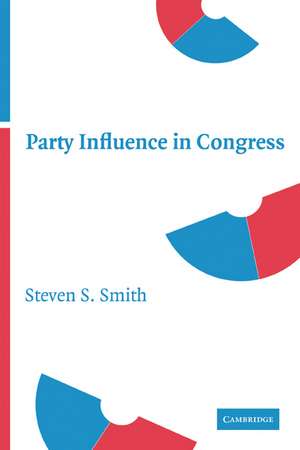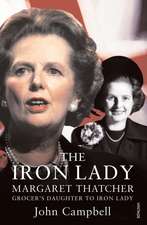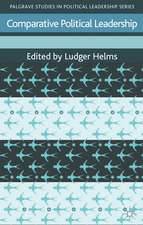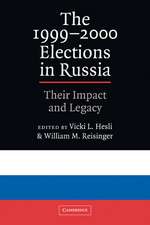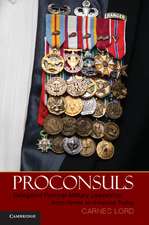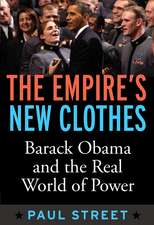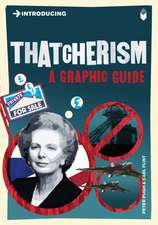Party Influence in Congress
Autor Steven S. Smithen Limba Engleză Paperback – 3 iun 2007
| Toate formatele și edițiile | Preț | Express |
|---|---|---|
| Paperback (1) | 260.11 lei 6-8 săpt. | |
| Cambridge University Press – 3 iun 2007 | 260.11 lei 6-8 săpt. | |
| Hardback (1) | 581.13 lei 6-8 săpt. | |
| Cambridge University Press – 27 mai 2007 | 581.13 lei 6-8 săpt. |
Preț: 260.11 lei
Nou
Puncte Express: 390
Preț estimativ în valută:
49.79€ • 51.24$ • 41.97£
49.79€ • 51.24$ • 41.97£
Carte tipărită la comandă
Livrare economică 01-15 martie
Preluare comenzi: 021 569.72.76
Specificații
ISBN-13: 9780521703871
ISBN-10: 0521703875
Pagini: 266
Ilustrații: 7 tables
Dimensiuni: 152 x 229 x 15 mm
Greutate: 0.37 kg
Editura: Cambridge University Press
Colecția Cambridge University Press
Locul publicării:New York, United States
ISBN-10: 0521703875
Pagini: 266
Ilustrații: 7 tables
Dimensiuni: 152 x 229 x 15 mm
Greutate: 0.37 kg
Editura: Cambridge University Press
Colecția Cambridge University Press
Locul publicării:New York, United States
Cuprins
1. Introduction; 2. The micro-foundations of theories of congressional parties; 3. The types and sources of party influences; 4. The search for direct party effects; 5. Recent theories of party influence: cartel and conditional party government theory; 6. Revisiting pivotal and party politics; 7. Reexamining the direct and indirect influence of party in the House and Senate; 8. More than a conclusion.
Recenzii
"Party Influence in Congress is required reading for students of Congress, parties, and national institutions more generally. Smith critiques a generation of scholarship on the impact of political parties on legislative behavior and outcomes, identifying both the strengths and shortcomings of existing theory and empirical work on parties in the House and Senate. Smith pushes scholars to acknowledge the limits of stylized treatments of party influence, and to build theory that provides a better match of analytical rigor and empirical reality. Smith's theoretical perspective coupled with historical and empirical nuance definitely moves the study of Congress forward."
Sarah Binder, Brookings Institution and George Washington University
"In this important and engaging book, Steven Smith masterfully assesses the state of scholarship on the role of parties in Congress. Moreover, he makes a trenchant argument for a more comprehensive theory of congressional parties, a theory that takes into account factors that, he argues persuasively, have until now been given inadequate attention. This book is essential reading for anyone interested in the influence of parties in Congress."
Diana Evans, Trinity College
"Steve Smith has done a public service for the field of legislative studies. Party Influence in Congress is a masterful, comprehensive analysis of the state of the literature on one of the most important topics in American politics. Smith provides a careful, evidence-based critique of current theory and then expert guidance on where scholars can go from here."
Frances Lee, Associate Professor of Government and Politics, University of Maryland
"In Party Influence in Congress, Steve Smith challenges current theories of party influence in Congress, and he rightfully criticizes these theories for being overly simplified and for focusing more on one chamber than on the other. In so doing, Smith marshals evidence that yields a more nuanced view of partisan influence one that goes beyond roll call voting and takes into account the multiple collective goals of parties and their leaders. Specifically, Smith demonstrates that the pathways through which parties move legislation in the House and Senate are different and have varied over time. This finding, along with his argument that parties provide order to roll call voting in both chambers and that a party's likelihood of winning increases as its size increases, is a novel addition to the literature. Indeed, throughout Smith's book are important theoretical insights that, together with the empirical evidence that he provides, lay the foundation for the next generation of theories of legislative organization. As always, I admire Smith's ability to weave so much evidence into one coherent argument. As with his other books, this one is so well written that even undergraduate audiences will find it accessible and compelling."
Mat McCubbins, Chancellor's Associates Chair in Political Science, University of California, San Diego and Visiting Professor of Law, University of Southern California
"A major work, an absolute must-read for scholars of Congress and parties. With his incisive analysis of prominent theories of party influence and his subtle and creative proposals for tackling the problems that a truly satisfactory theory must confront, Smith decisively sets the direction for future work in this central domain of scholarship."
Barbara Sinclair, Marvin Hoffenberg Professor of American Politics, University of California, Los Angeles
Sarah Binder, Brookings Institution and George Washington University
"In this important and engaging book, Steven Smith masterfully assesses the state of scholarship on the role of parties in Congress. Moreover, he makes a trenchant argument for a more comprehensive theory of congressional parties, a theory that takes into account factors that, he argues persuasively, have until now been given inadequate attention. This book is essential reading for anyone interested in the influence of parties in Congress."
Diana Evans, Trinity College
"Steve Smith has done a public service for the field of legislative studies. Party Influence in Congress is a masterful, comprehensive analysis of the state of the literature on one of the most important topics in American politics. Smith provides a careful, evidence-based critique of current theory and then expert guidance on where scholars can go from here."
Frances Lee, Associate Professor of Government and Politics, University of Maryland
"In Party Influence in Congress, Steve Smith challenges current theories of party influence in Congress, and he rightfully criticizes these theories for being overly simplified and for focusing more on one chamber than on the other. In so doing, Smith marshals evidence that yields a more nuanced view of partisan influence one that goes beyond roll call voting and takes into account the multiple collective goals of parties and their leaders. Specifically, Smith demonstrates that the pathways through which parties move legislation in the House and Senate are different and have varied over time. This finding, along with his argument that parties provide order to roll call voting in both chambers and that a party's likelihood of winning increases as its size increases, is a novel addition to the literature. Indeed, throughout Smith's book are important theoretical insights that, together with the empirical evidence that he provides, lay the foundation for the next generation of theories of legislative organization. As always, I admire Smith's ability to weave so much evidence into one coherent argument. As with his other books, this one is so well written that even undergraduate audiences will find it accessible and compelling."
Mat McCubbins, Chancellor's Associates Chair in Political Science, University of California, San Diego and Visiting Professor of Law, University of Southern California
"A major work, an absolute must-read for scholars of Congress and parties. With his incisive analysis of prominent theories of party influence and his subtle and creative proposals for tackling the problems that a truly satisfactory theory must confront, Smith decisively sets the direction for future work in this central domain of scholarship."
Barbara Sinclair, Marvin Hoffenberg Professor of American Politics, University of California, Los Angeles
Notă biografică
Descriere
Party Influence in Congress challenges current arguments and evidence about the influence of parties in the US Congress.
